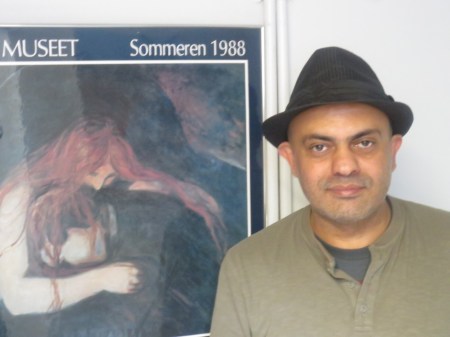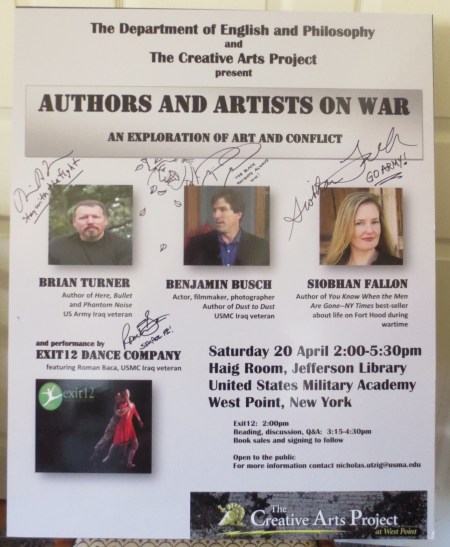
Time Now’s pace-of-production has slowed down recently, no doubt. Part of it’s that I’m busy, part of it’s that I’m moving on personally, part of it’s because it doesn’t seem as urgent now to document and catalog works about war in Iraq and Afghanistan as it did in, say, 2014. Frankly, there’s not as much to report on, though recent movies such as The Outpost suggest that the wars have not completely lost the interest of audiences and artists. Still, for the most part I’ve written on the novels, short-story collections, poetry volumes, movies, and art about the wars that I know of and which engage me, so I’m not even sure what more there’s to say until a second wave of titles comes along.
Time Now dates back to 2011, but only last night did I figure out how to search for a list of the most popular posts. The top post, “39 American Iraq and Afghanistan War Poets,” didn’t surprise me, since it’s perennially affixed at the top of my publicly-visible recently-viewed feature. The next nine for the most part did surprise me, and so too did the absence of some posts that I thought had made more of an impression, but which didn’t crack the Top 10. Below’s the list of the Top 10 with capsule reflections on each:
1. “39 American Iraq and Afghanistan War Poets.” This post has been viewed nearly three times more than the runner-up in popularity. All good; all power to the poets and the online sites that publish them. I don’t know why someone doesn’t publish a print anthology along these lines—I’m sure it would sell as much as any poetry volume sells, and even better it would stand a chance of being a lasting historical document.
2. “Tim O’Brien’s ‘Story Truth’ and ‘Happening Truth’ in the Contemporary War Novel.” Go figure one of the top posts on a blog about Iraq and Afghanistan war lit features the dean of Vietnam War novelists, Tim O’Brien, but whatever—O’Brien’s influence indeed looms large over the contemporary scene. I’m happy as well to shine light on Michael Pitre’s very interesting Fives and Twenty-Fives (and when will we see more from Pitre?).
3. “Iraqi Iraq War Short Fiction: Hassan Blasim’s ‘The Green Zone Rabbit.'” I’ve tried to pay attention to literature about the wars in Iraq and Afghanistan written by Iraqis and Afghans, and no one represents that cohort of writers better than Blasim. Funny though, I’ve never written a dedicated post on Blasim’s superb short-story collection The Corpse Exhibition, even as arranging a reading by Blasim at West Point in 2014 remains a literary-life highlight.
4. “War Poetry: Brian Turner’s ‘A Soldier’s Arabic.'” A short post about one of Turner’s most beautiful poems, featuring a wonderful pictorial representation by Giulia Alvarez, a student at Horace Mann Prep school in NYC I met while visiting a class there.
5. “Roy Scranton’s Learning to Die in the Anthropocene: Bleakly Optimistic or Brightly Pessimistic?” I like almost all my posts, but Scranton’s doomsday treatise is one that I think really inspired my own powers of insight and expression, so thanks, Roy. Thanks also to my brother Jason who suggested the “bleakly optimistic or brightly pessimistic” formulation in the title.
6. “Fire and Forget III: Mariette Kalinowski’s ‘The Train.'” Works by women veterans have been a salient feature of post-9/11 war-writing, but they’ve been concentrated in the forms of memoir and verse. Kalinowski’s great story makes me wish we had more fiction titles by her and other women vets.
7. “Paul Wasserman, Say Again All.” USAF vet Paul Wasserman read at a war-writing-and-art event I organized at West Point, self-published this hard-to-find chapbook, and since seems to have not published anything else and dropped out of the writing game altogether. Say Again All is excellent, though, and I’m happy that readers continue to make their way to this tribute to it.
8. “Fire and Forget: Short Stories.” Should probably be first on this list, judging by achievement and importance. What a talented and ambitious group of young vet-writers (plus Siobhan Fallon, no slouch herself) brought together between the two covers! The story of how the Fire and Forget authors joined forces and their divergent career paths afterwards is THE story waiting to be written about the Iraq and Afghanistan war-writing scene.
9. “Toni Morrison’s Home: The Africanist Presence in War Literature.” Morrison wrote no fiction about Iraq or Afghanistan, but in this post and others on her I’ve tried to explain that her mammoth presence in modern American letters constituted a force to be reckoned with by contemporary war-writers and readers of all races.
10. “A Contemporary War Short Fiction Listicle.” Honestly, this post was pretty-much a throwaway, done quickly to fill a gap between more trenchant ones. Also honestly: it holds-up, or at least the stories to which I point to do, and I’m not so sure how I would write it differently today.

